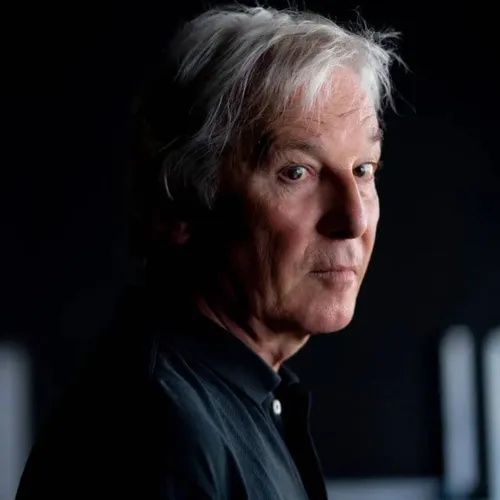
Robert HP Platz studied composition with Wolfgang Fortner in Freiburg Conservatory and conducting with Francis Travis. In 1973, he followed in Cologne training with Karlheinz Stockhausen.
In 1978-1979, he won a scholarship from the Heinrich Strobel Foundation Radio Südwestfunks allowing him to travel to the United States and Paris (IRCAM).
From 1983 to 2001 he directed the Ensemble Köln he founded. As a conductor, he was invited - among others - by the Ensemble Modern, Klangforum Wien and der Reihe, Deutsche Symphony Orchestra, the WDR Radio Orchestra, the Symphony Orchestra of the SWR Freiburg / Baden-Baden and Stuttgart ...
He has directed over three hundred creations throughout Europe, the US and Japan, in festivals such Musik der Zeit (WDR), Musica Strasbourg, the International Meetings of Contemporary Music Metz, Salzburg festival, ... He is the principal guest conductor of the l'ensemble Alternance to Paris and Musica d'Insieme in Milan.
In 1990, at the invitation of the Rockefeller Foundation, Robert HP Platz is in residence at the Villa Serbelloni and Japan two years later. His compositions are mainly dedicated to chamber music and the scene.
Since 1990, he taught composition at the School of Maastricht. In addition, there is a guest speaker in many countries. It notably gives master classes at Darmstadt in 1986, 1996 and 2002, as well as Japan, Poland, the Netherlands and the United States. He is artistic director of the Fall Festival Schreyahn since 2000 and member of the research and Wallonia Musical Training Centre (CRFMW) of Liège since 2005.
Pendant de longues années, je me suis tenu à l'écart du hautbois, je m'intéressais aux transitions fluides entre les timbres orchestraux et il était impossible d'exiger une entrée quasi inaudible d'un instrument à anche double comme le hautbois. Cependant, j'ai toujours été impressionné par l'art d'Heinz Holliger et j'ai donc écrit un morceau pour lui : la couleur particulière de son instrument laisse désormais son empreinte sur la sonorité de l'ensemble de l'orchestre, tout le long vers une domination d'accents vifs sur des transitions fluides, incluant l'instrument solo dans le son de l'orchestre s'il n'est pas mis en opposition à l'orchestre dans des gestes évoquant la musique de chambre.
Un cor anglais qui, à distance, évoque dans la sonorité le topoi romantique, fait surtout l'objet d'une polyphonie enveloppant l'espace de performance. Ce dialogue entre le cor anglais et le hautbois, associé à un rappel écrit tout spécialement pour les représentations de Blaue See, je l'ai mis dans une partition à jouer séparément : See.
Je voulais éviter un rappel de « mon » soliste, pris à contre-chant d'un compositeur ancien, après tout, j'apporte de la polyphonie à l'aide de ce contre-chant directement à ma pièce. Et je garde précieusement cette polyphonie, à la fois musicalement et comme ma vision du monde.
La polyphonie signifie : respecter l'autre dans sa différence, respecter sa dignité. Seule la disparité des parties/voix constitue un ensemble vivant et nous nous reconnaissons seulement dans le reflet de l'autre.
(trad) Robert HP PLATZ